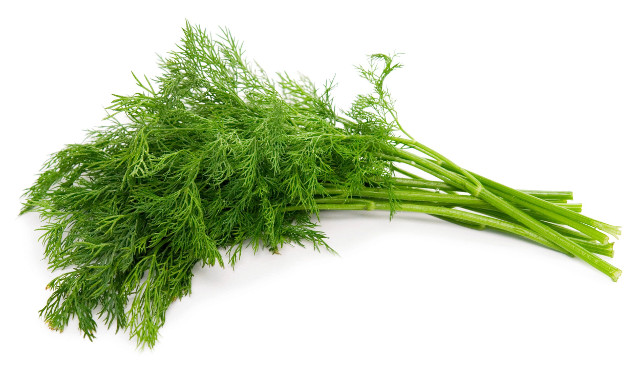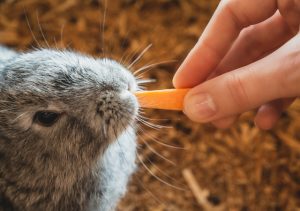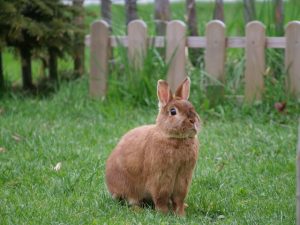Can rabbits eat dill, dill flowers, or baby dill?
Yes, rabbits can eat dill plants. And yes, rabbits can also have dill flowers or baby dill. Dill is an excellent treat, better than fruits or non-leafy vegetables like carrots, no matter the amazement. Rabbits will enjoy it in a big way. And because accepted fruits and non-leafy vegetables need to be limited to a very small amount (because of their high-in-sugar and low-in-fiber content), dill is a better alternative.
Dill, like many other herbs, will support intestinal motility, teeth wear off, and cecotrope pellets formation. It's light in calories and fats but full of vitamins, minerals, fibers, and antioxidants. Antioxidants can cope with pesticides when your rabbit by mistake has had some. Also, antioxidants can prevent or fight, on the front line, with big health issues. If he is not having enough fiber or too much starchy content he may suffer from GI stasis.
Not all rabbits will find dill a tasty herb. Some of them can be picky. Some will enjoy herbs like basil, oregano, parsley, dill, cilantro, rosemary, tarragon, lavender, or peppermint. All these herbs are a small affair with a surprising effect. You should find the ones your rabbit prefers.
Sometimes, spices and herbs are dangerous for bunnies. We advise you to carefully look up any herb you want to give your rabbit. Hundreds of herbs are poisonous to rabbits. Avoid agave leaves, aloe, amaryllis, buttercup, belladonna, echinacea, eucalyptus, jasmine, lily of the valley, milkweed, or oak leaves. Always check! Better safe tan sorry.
How to feed dill or other herbs?
Herbs can add flavor, variety, and texture to your rabbit's hay or fresh meal. Choose fresh herbs when available or dried when they are out of season. You can store them in the refrigerator for a few days, or you can freeze them for future "out-of-the-season" feedings.
Scatter some dried herbs on watery vegetables. The water will bring them to life and your rabbit will enjoy the flavor of the herbs like during their season. Herbs can make the usual veggies taste better. Always remember to introduce new foods or flavors slowly. Wait for 24 hours to see if there are any signs of digestive upset.
You may try a combination of a dark green lettuce, with some spinach or kale, and a herb (dill, mint, or another one that is accepted). Never feed a new vegetable with another bunch of new veggies. You can mix things up only when you are sure that your rabbit reacts well to every single one of them. Switch them up, create new combinations and your rabbit will be delighted. Try to provide him with enough vitamin A, but not with too much calcium or oxalates. Read more about vitamin A, calcium, and oxalates in a rabbit's diet.
However, these wonderful herbs are not a replacement for hay. Yes, rabbits can eat fresh or dried dill but you should never exaggerate with it. Just a topping for his hay or veggies. Try to have a plan and limit your rabbit dill intake to no more than 3 threads of dill per day. He can have it as often as he likes, but we advise you to change it with other herbs, too.
Clean the cage of the uneaten parts of the vegetables or herbs. Rotten or moldy plants are not doing any good to your rabbit health. If you give too many vegetables to your rabbit he will either overeat or scatter them all over the place. Replace them with the right quantity the next day, depending on his usual needs.
Dill and other herbs promote intestinal health!
Always pay attention to your rabbit's fecal pellets. If you notice any change in appearance (harder, too watery, unusual color, in larger or smaller quantity), eliminate all herbs and feed only hay and water until his digestive system gets back to the normal activity. Gradually reintroduce fresh food again.
When your rabbit is not eating enough fiber or too much sugar he may stop eating or produce fecal pellets. If that is happening for about 12 hours or more this is not a good sign. You should consider the condition an emergency. Get your rabbit to a vet immediately.
There are some techniques to help your rabbit in this situation. The fiber and moisture in fresh vegetables may stimulate the intestine. If the rabbit refuses to eat, try fragrant, fresh herbs such as the mentioned above: dill, mint, parsley, basil, cilantro, tarragon, fennel, and others. Try to cut off the ends of the stems in multiple parts. Wave them under the bunny's nose. Try to be as persuasive as possible. Dill is also known to help rabbits who suffer or who had previously suffered from GI stasis.
Dill pickles or pickled cucumbers are something totally different than dill. Never feed pickles to your rabbit. It's a really bad choice for their intestinal health. It can lead to very bad consequences.
In conclusion, dill is totally safe as long as it doesn't contain any pesticides. Therefore, choose the one that is free of chemicals. Always wash it properly. When consuming too many tasty foods there is a risk that your rabbit will refuse hay. Be sure your rabbit consumes his daily portion of hay.






